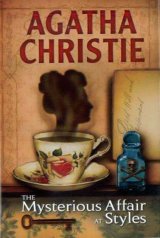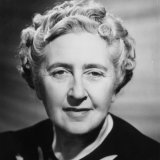The Mysterious Affair at Styles Page #8
The Mysterious Affair at Styles is a detective novel by British writer Agatha Christie. It was written in the middle of the First World War, in 1916, and first published by John Lane in the United States in October 1920 and in the United Kingdom by The Bodley Head on 21 January 1921.
I confess that I was surprised by Lawrence’s attitude. He was so seldom vehement about anything. John hesitated. “I can’t feel as you do, Lawrence,” he said at last. “I’m inclined to give Hastings a free hand, though I should prefer to wait a bit. We don’t want any unnecessary scandal.” “No, no,” I cried eagerly, “you need have no fear of that. Poirot is discretion itself.” “Very well, then, have it your own way. I leave it in your hands. Though, if it is as we suspect, it seems a clear enough case. God forgive me if I am wronging him!” I looked at my watch. It was six o’clock. I determined to lose no time. Five minutes’ delay, however, I allowed myself. I spent it in ransacking the library until I discovered a medical book which gave a description of strychnine poisoning. CHAPTER IV. POIROT INVESTIGATES The house which the Belgians occupied in the village was quite close to the park gates. One could save time by taking a narrow path through the long grass, which cut off the detours of the winding drive. So I, accordingly, went that way. I had nearly reached the lodge, when my attention was arrested by the running figure of a man approaching me. It was Mr. Inglethorp. Where had he been? How did he intend to explain his absence? He accosted me eagerly. “My God! This is terrible! My poor wife! I have only just heard.” “Where have you been?” I asked. “Denby kept me late last night. It was one o’clock before we’d finished. Then I found that I’d forgotten the latch-key after all. I didn’t want to arouse the household, so Denby gave me a bed.” “How did you hear the news?” I asked. “Wilkins knocked Denby up to tell him. My poor Emily! She was so self-sacrificing—such a noble character. She over-taxed her strength.” A wave of revulsion swept over me. What a consummate hypocrite the man was! “I must hurry on,” I said, thankful that he did not ask me whither I was bound. In a few minutes I was knocking at the door of Leastways Cottage. Getting no answer, I repeated my summons impatiently. A window above me was cautiously opened, and Poirot himself looked out. He gave an exclamation of surprise at seeing me. In a few brief words, I explained the tragedy that had occurred, and that I wanted his help. “Wait, my friend, I will let you in, and you shall recount to me the affair whilst I dress.” In a few moments he had unbarred the door, and I followed him up to his room. There he installed me in a chair, and I related the whole story, keeping back nothing, and omitting no circumstance, however insignificant, whilst he himself made a careful and deliberate toilet. I told him of my awakening, of Mrs. Inglethorp’s dying words, of her husband’s absence, of the quarrel the day before, of the scrap of conversation between Mary and her mother-in-law that I had overheard, of the former quarrel between Mrs. Inglethorp and Evelyn Howard, and of the latter’s innuendoes. I was hardly as clear as I could wish. I repeated myself several times, and occasionally had to go back to some detail that I had forgotten. Poirot smiled kindly on me. “The mind is confused? Is it not so? Take time, mon ami. You are agitated; you are excited—it is but natural. Presently, when we are calmer, we will arrange the facts, neatly, each in his proper place. We will examine—and reject. Those of importance we will put on one side; those of no importance, pouf!”—he screwed up his cherub-like face, and puffed comically enough—“blow them away!” “That’s all very well,” I objected, “but how are you going to decide what is important, and what isn’t? That always seems the difficulty to me.” Poirot shook his head energetically. He was now arranging his moustache with exquisite care. “Not so. Voyons! One fact leads to another—so we continue. Does the next fit in with that? A merveille! Good! We can proceed. This next little fact—no! Ah, that is curious! There is something missing—a link in the chain that is not there. We examine. We search. And that little curious fact, that possibly paltry little detail that will not tally, we put it here!” He made an extravagant gesture with his hand. “It is significant! It is tremendous!” “Y—es——” “Ah!” Poirot shook his forefinger so fiercely at me that I quailed before it. “Beware! Peril to the detective who says: ‘It is so small—it does not matter. It will not agree. I will forget it.’ That way lies confusion! Everything matters.” “I know. You always told me that. That’s why I have gone into all the details of this thing whether they seemed to me relevant or not.” “And I am pleased with you. You have a good memory, and you have given me the facts faithfully. Of the order in which you present them, I say nothing—truly, it is deplorable! But I make allowances—you are upset. To that I attribute the circumstance that you have omitted one fact of paramount importance.” “What is that?” I asked. “You have not told me if Mrs. Inglethorp ate well last night.” I stared at him. Surely the war had affected the little man’s brain. He was carefully engaged in brushing his coat before putting it on, and seemed wholly engrossed in the task. “I don’t remember,” I said. “And, anyway, I don’t see——” “You do not see? But it is of the first importance.” “I can’t see why,” I said, rather nettled. “As far as I can remember, she didn’t eat much. She was obviously upset, and it had taken her appetite away. That was only natural.” “Yes,” said Poirot thoughtfully, “it was only natural.” He opened a drawer, and took out a small despatch-case, then turned to me. “Now I am ready. We will proceed to the château, and study matters on the spot. Excuse me, mon ami, you dressed in haste, and your tie is on one side. Permit me.” With a deft gesture, he rearranged it. “Ça y est! Now, shall we start?” We hurried up the village, and turned in at the lodge gates. Poirot stopped for a moment, and gazed sorrowfully over the beautiful expanse of park, still glittering with morning dew. “So beautiful, so beautiful, and yet, the poor family, plunged in sorrow, prostrated with grief.” He looked at me keenly as he spoke, and I was aware that I reddened under his prolonged gaze. Was the family prostrated by grief? Was the sorrow at Mrs. Inglethorp’s death so great? I realized that there was an emotional lack in the atmosphere. The dead woman had not the gift of commanding love. Her death was a shock and a distress, but she would not be passionately regretted. Poirot seemed to follow my thoughts. He nodded his head gravely. “No, you are right,” he said, “it is not as though there was a blood tie. She has been kind and generous to these Cavendishes, but she was not their own mother. Blood tells—always remember that—blood tells.” “Poirot,” I said, “I wish you would tell me why you wanted to know if Mrs. Inglethorp ate well last night? I have been turning it over in my mind, but I can’t see how it has anything to do with the matter?” He was silent for a minute or two as we walked along, but finally he said:
Translation
Translate and read this book in other languages:
Select another language:
- - Select -
- 简体中文 (Chinese - Simplified)
- 繁體中文 (Chinese - Traditional)
- Español (Spanish)
- Esperanto (Esperanto)
- 日本語 (Japanese)
- Português (Portuguese)
- Deutsch (German)
- العربية (Arabic)
- Français (French)
- Русский (Russian)
- ಕನ್ನಡ (Kannada)
- 한국어 (Korean)
- עברית (Hebrew)
- Gaeilge (Irish)
- Українська (Ukrainian)
- اردو (Urdu)
- Magyar (Hungarian)
- मानक हिन्दी (Hindi)
- Indonesia (Indonesian)
- Italiano (Italian)
- தமிழ் (Tamil)
- Türkçe (Turkish)
- తెలుగు (Telugu)
- ภาษาไทย (Thai)
- Tiếng Việt (Vietnamese)
- Čeština (Czech)
- Polski (Polish)
- Bahasa Indonesia (Indonesian)
- Românește (Romanian)
- Nederlands (Dutch)
- Ελληνικά (Greek)
- Latinum (Latin)
- Svenska (Swedish)
- Dansk (Danish)
- Suomi (Finnish)
- فارسی (Persian)
- ייִדיש (Yiddish)
- հայերեն (Armenian)
- Norsk (Norwegian)
- English (English)
Citation
Use the citation below to add this book to your bibliography:
Style:MLAChicagoAPA
"The Mysterious Affair at Styles Books." Literature.com. STANDS4 LLC, 2025. Web. 31 Jan. 2025. <https://www.literature.com/book/the_mysterious_affair_at_styles_309>.








Discuss this The Mysterious Affair at Styles book with the community:
Report Comment
We're doing our best to make sure our content is useful, accurate and safe.
If by any chance you spot an inappropriate comment while navigating through our website please use this form to let us know, and we'll take care of it shortly.
Attachment
You need to be logged in to favorite.
Log In